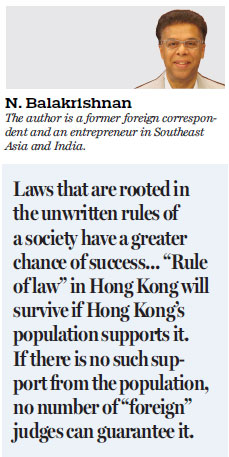'Western justice superiority' the last imperial prejudice in HK
Updated: 2017-03-31 09:48
(HK Edition)
|
|||||||
According to the "international" media it is important for "Hong Kong people to rule Hong Kong" without interference from the Chinese mainland. But when it comes to Hong Kong's judiciary and courts, the same Hong Kong people who are considered wise and mature enough to rule themselves are not considered good enough to dispense justice without mandatory presence of foreign judges in the Court of Final Appeal! This sort of double standard when it comes to "justice" as viewed in China has a long history.
In his book Legal Orientalism, published in 2013, Professor Teemu Ruskola points out the astonishing fact that the "Chinese Exclusion Act", a blatantly racist ordinance passed by the United States government in 1844 to prevent Chinese immigration into the US, was justified, among other things, by saying that the Chinese have always been used to despotic rule and that they could not be expected to understand or live under American law. This in a country which declared its independence with the phrase "All men are created equal" but where courts did not see much problem with slavery or trading of human beings for about 90 years after its independence.

It is the same attitude that led to the demand for "extraterritoriality" in 19th century China - that white people in "treaty ports" should be judged by white judges only.
We have some good records on proceedings of "foreign courts" established in the treaty ports of China and any objective view of the records would have to conclude that Chinese law too had its merits and that "Western law" was not always superior, especially when it came to dispensing justice to the local Chinese population.
To take one example. Chinese law in the 18th century forbade gun salutes by ships, which is surely a dangerous practice but the British ships usually ignored it. In 1784 when a parting gun salute was fired from the British ship Lady Hughes, two Chinese men were killed. The Chinese insisted on investigating the case themselves and two foreigners were sentenced to death as the Chinese did not think much of concepts such as "accidental homicide" which let the culprits who had clearly broken laws go scot free. A Chinese law was clearly broken and two deaths occurred because of it, but foreigners protested that they must be judged by their own kind for justice to be served. Thus, was born the demand for "extraterritorial" justice and the whole sorry history of "apartheid justice".
Before the usual suspects descend on me about being an apologist for China's legal system, let us just imagine the outrage that will be expressed if the Chinese immigrants to the US or elsewhere ask to be judged by "Chinese law".
The wealthy people who can afford it now go "legal" or "jurisdiction shopping" and seek countries where they can "buy the best justice available". For example, "character libel" is very difficult to prove in the US and that is why the press is wild in the US. In the UK libel is quite easy to prove and the only reason there have not been more British celebrities suing papers for libel is because of unwritten rules in British society that frown on public figures suing the press. But that is changing now and even many of the US celebrities are now taking to suing the papers in the UK where it is easier to win libel cases. We can thus see that not just laws but enforcement of laws depends on cultural, social and even historical context.
While I was in college in the UK many years ago, two friends of mine - one British and another Ethiopian - were arrested in London during a political demonstration. While waiting for the charges my British friend asked whether he had the "right to remain silent" to which the British bobby replied that my friend had been watching too many American TV shows and there was no such right under British law! He also turned to the Ethiopian and said he was lucky to be arrested in London rather than in Ethiopia since in his own country he would have been killed after being arrested. No one should underestimate the legal knowledge of British bobbies!
A moment of reflection will make us realize that a billion people in China cannot be living in lawless limbo. Chinese society, like other societies, has many unwritten rules stretching back many millennia that keep it ticking. As China itself acknowledges, Chinese written, formal laws need modernizing and it is true that Hong Kong laws, which are more in tune with international laws, have something to teach the mainland. But it is not a one-way street as anyone who has dealt with the expensive way in which Hong Kong's law operates should know.
China is not the only country with unwritten laws. In the Munich U-Bahn in Germany, at least when my friend used it a few years ago, you can enter the station without having to buy a ticket but law-abiding Germans buy the ticket anyway. If you followed the same system in New York no one would buy a ticket.
Laws that are rooted in the unwritten rules of a society have a greater chance of success. There will never be enough police in Hong Kong to make sure everyone queues for the minibus but there is no need to because the local people do it without being told. "Rule of law" in Hong Kong will survive if Hong Kong's population supports it. If there is no such support from the population, no number of "foreign" judges can guarantee it.
(HK Edition 03/31/2017 page1)